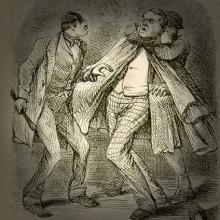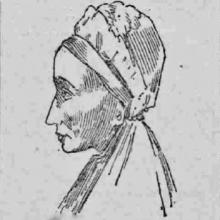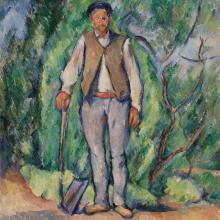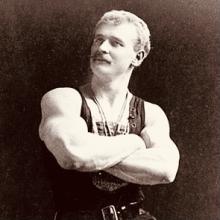
1847–48
DARING ROBBERY.
It is with regret, that we have to record another of those daring outrages which have of late been the disgrace of our city.
On Thursday night, about twelve o’clock, a gentleman who resides in Broughton Place was knocked down on his way home, in the lane which branches off from the east side of Elder Street,[1] and robbed of his watch and five pounds.
He was felled to the ground at once by a violent blow with a bludgeon, or other instrument, and remained on the street for a considerable time in a state of insensibility, while the ruffians searched his person and carried off his watch and money. He received several severe blows after he had fallen, his assailants being determined to make sure of him. He is still confined to bed with dreadful contusions on the head and face, and has no recollection of anything that took place after receiving the blow.
Within these four or five weeks no less than five robberies, attended with personal violence, more or less dangerous, have occurred, while not more than two of the guilty persons have been apprehended, and these only on suspicion. It is extremely doubtful if one conviction will follow. There can not be a more lamentable proof of the insecurity of our streets, and of the inadequacy of the police, from whatever cause, for the protection of the inhabitants.
It was only about a month since a gentleman in Broughton Place was robbed while opening his own door, about half-past 10 o’clock, and nearly choked by the violent grip of the ruffians on his throat, from which we understand he is by no means recovered, having been for some days hardly able to speak.
Another robbery of the same kind was committed in Elm Row. A young man was, nearly about the same time, knocked down and robbed in the Lothian Road, between 11 and 12 o’clock, while the robbery in St John Street occurred about 10 o’clock, the Canongate being at the time crowded with people.
It thus appears that it is not safe to venture into the streets at night. These robberies and outrages were perpetrated, not at any untimely hour, but mostly before 12 o’clock, when it never was before thought unsafe to walk the streets. But a great change has taken place; ruffianism is on the increase, and thieves appear to be constantly prowling about watching the streets on the outlook for plunder.
The police, it is clear, affords no security, while from the undetected robberies the guilty derive security and encouragement to commit fresh crimes. The frequency of these outrages calls for increased vigilance, and a more efficient body of night watchmen; and they ought to be obtained at whatever expense; for protection, like every thing else, must be paid for. It is needless to grudge the price, for we cannot have the article without paying for it.—Courant
Caledonian Mercury, 15 February 1847
[1] More commonly known as Swinton Row, it was largely covered by the St James Centre multistorey car park in the 1970s.
*****
THE GREAT MATCH AT DRAUGHTS.—This match, which has been in the course of playing at the Robin Hood Tavern, Gabriel’s Road, between Mr Anderson of Carluke, and Mr Wyllie, commonly known by the name of “the herd laddie,” is still “dragging its weary length along.”
Last night the match stood thus—Anderson 8—Wyllie, 5, and 26 games drawn. There has been no game won on either side since Saturday,[2] and it is impossible to calculate when the match may terminate—as Wyllie is now acting entirely on the defensive, and Anderson seems afraid to take any decided step in the attack. From ten o’clock yesterday morning till seven in the evening, only three games were played, and all drawn.
Caledonian Mercury, 11 March 1847
[2] This item appeared on the following Thursday. Compare with the 2018 World Chess Championship, in which the defending champion Magnus Carlsen and Fabiano Caruana tied 6 games each before Carlsen won through with 3 consecutive rapid-chess deciders.
*****
POLICE COURT.
PRINTERS’ STRIKE.—On Saturday James Slyman, George Mitchell, Lachlan M’Lachlan, and David Main, were charged before Bailie Tullis, the sitting magistrate, with being guilty of the crimes of malicious mischief, breach of the peace, and assault, having, without authority, on the 10th of March last, entered the premises of Messrs Blackwood & Sons, printers publishers, in West Rose Street Lane, and with mischievously and wilfully damaging one or more pages of types of Blackwood’s Magazine, and also disarranging one or more pages—with behaving in a most riotous and disorderly manner, using threatening and insulting language towards James Moffat, and attacking, assaulting, and striking Joseph Phair, and assaulting John Pollock, whereby he was put to fear and alarm, the said James Moffat, Joseph Phair, and John Pollock being all in the employment of Messrs Blackwood & Sons. William Bruce was also indicted on the same charge, but failing to appear, the case was continued against him and a warrant issued for his apprehension.
Mr Blackwood, publisher, knew the prisoners.[3] Slyman was a son of the manager of his printing office. All the prisoners left his employment, and to supply their places he had got Phair, Pollock, John Newberry, and Richard Symons from England.
James Moffat, a reader in Messrs Blackwood’s employment, was in the office during the dinner hour when Slyman entered, apparently tipsy. After behaving to witness in a most insolent manner, he drew up the window and whistled, when the other prisoners, along with Bruce, came up. All the types were in good order. Slyman lifted some matter from Pollock’s composing stick and emptied it, making use of coarse expressions. Witness remonstrated with him, and begged him to let it alone. In a short time witness went to the imposing stone where he found a page of the Magazine broken, one disarranged, and some transposed. Witness charged Slyman with the offence, but he denied it. He had understood since it was not Slyman. The prisoner M’Lachlan expressed his regret at the offence, and wished to get away, and gave a shilling to witness’s father, who was also in Messrs Blackwood’s employment, to get it arranged.
Joseph Phair, a compositor—The prisoners were in the act of coming down stairs, when he went in to his work. He was struck by Slyman on the mouth, who called him ‘a bloody English rat.’ Witness ran along the lane, when Slyman followed, and gave him a blow on the head and knocked off his cap. Went up to the composing room, and saw the types in disorder.
Richard Symons, and John Newbery, corroborated the above evidence, and John Pollock deponed to having been assaulted by Slyman. James Steadman, a boy about twelve, was examined upon oath, and corroborated the evidence of Moffat and the other witnesses in most particulars.
The public prosecutor asked for a conviction against Slyman on all the charges; and with regard to the others asked a conviction against them for mischievous damage of property for all having been together, they were in law equally responsible for the damages committed.
Bailie Tullis then fined Slyman L.6,[4] with the alternative of 40 days’ imprisonment and to find caution for L.5, to keep the peace for one year, or endure 20 days’ imprisonment in addition.
Mitchell and Main were fined L.3 each, or to suffer 20 days’ imprisonment and to find security for L.5, failing which ten days’ imprisonment in addition.
M’Lachlan, as he had endeavoured to prevent the damage, was fined in the modified sum of L.1 or ten days’, and five days’ more if he did not find similar caution.
The Magistrate at the same time, warned the prisoners that although they had a right to make the best possible use of their own time, they had no right to interfere with that of others.[5]
Caledonian Mercury, 19 April 1847
[3] John Blackwood (1818–79) had been the Editor of Blackwood’s Edinburgh Magazine since 1845. The Tory-leaning ‘Maga’ was published between 1817 and 1980.
[4] About £480 today, or 30 days’ wages for a skilled tradesman.
[5] From this, and the article’s subtitle, it appears that Slyman, Mitchell, Main, M’Lachlan and Bruce were on strike, and had come to disrupt the work of blacklegs and scabs. The staff were presumably working on Volume 61, Issue 379.
*****
AIRING OF HORSES IN LANES.
TO THE EDITOR OF THE SCOTSMAN.
SIR,—Having seen a paragraph in your paper of the 12th curt. regarding the airing of horses[6] in Young Street, and as I carry on my business in a lane of a similar kind, I take the liberty of inquiring how it happens that the police magistrates’ powers do not extend to lanes as well as to the street, more especially when it is considered that so many banks, insurance offices, merchants and tradesmen, have premises in lanes.
Surely this is the time to get such powers extended, as it is a notorious fact that horses are allowed to be exercised at all times of the day, and worse than that, the owners of them lay down filth off the dunghill to make them ride easily. In wet weather, therefore, the lane becomes a perfect puddle, injurious to the health, besides leading to the stoppage of drains, &c.
I consider it a very hard case that a person carrying on business in a lane is to be subject to the nuisance of horses exercising every hour of the day. Perhaps some of your numerous correspondents may be able to give some information on the subject.—I am, &c.
J. B.
Scotsman, 29 January 1848
[6] Airing a horse, according to Abraham Rees, ‘should be distinguished from that species of exercise used in training horses for racing, as this is conducted at regular periods, and has in view not only the general health, but particularly the acquirement of wind and speed’. He recommends airing a horse twice a day. ‘ In an airing the horse should first be walked, then trotted, and lastly moderately galloped …’ (The Cyclopaedia: or Universal Dictionary of Arts, Sciences, and Literature, Vol. 1 [London, 1819]).
*****
AIRING OF HORSES IN LANES.
TO THE EDITOR OF THE SCOTSMAN.
SIR,—A letter appeared in your paper of Saturday[7] last regarding the airing of horses in Young Street, or rather, your correspondent should have stated, in Young Street Lane.
Young Street Lane is a place built originally and intended only for the keeping, &c., of horses; and surely it is not too much to ask that those who pay rent for premises for stables, as such, should have the right of exercising their horses opposite such premises in the open air. This is done only in the lane, without crossing the street, or subjecting those on it to any annoyance; and the best proof of what I assert is, that residenters of twenty years’ standing, who “have premises in the lane,” can easily be found to deny that they have ever been impeded in their business, or injured in their feelings, by “the airing of horses in Young Street Lane.”
As to the “notorious fact” mentioned by your correspondent that ““the owners of the horses lay down filth off the dunghill to make them ride easily,” I have only to observe that such is not the fact. The litter taken from the bed of the horses is, in frosty weather, laid down to keep their feet from slipping; but is never laid out in wet weather. In opposition to the statement of your correspondent “J. B.,” I may remark that the magistrates have taken powers in regard to lanes; and that these powers have been exercised by one of the bailies of Edinburgh declaring that so long as we do not cross the street, nor ride our horses in a furious manner, we have the privilege of airing our horses in Young Street Lane.
We are not allowed to air our horses in the public streets; and if we be denied this privilege before the premises in which they are kept, and for which we pay a high rent, where are we to do so?—I am, &c.,
A Party Interested
Scotsman, 9 February 1848
*****
BODY FOUND.—On Saturday afternoon the corpse of a man was discovered floating on the Water of Leith at Bonnington Distillery. It has since been identified as the body of a wright named John Kay, in the employment of Messrs Goodall & Sanderson, Old Broughton, who had been missing for seven weeks. It is supposed that he was accidentally drowned, and that his body had remained in the water during that time.
Caledonian Mercury, 27 March 1848
*****
SHERIFF CRIMINIAL COURT.—[…] Sheriff Gordon presided. Thomas Laidlaw, upholsterer, pleaded guilty to housebreaking and theft, he having on the 8th August entered, by a skylight, the premises of Mr Hogg, upholsterer, East Cumberland Street Lane, and abstracted about 25 lb. of hair. The sentence was four months’ imprisonment.
Jane Wilson M’Kell, servant to a gentleman in Pitt Street, was charged with having, on various occasions, to the complainer unknown, stolen a variety of articles, the property of her employer. The indictment was a perfect inventory of stolen goods, comprising bottles, rice, sugar, tea, wearing apparel, and many other res familiares. The panel admitted the accusation of theft, but not that of opening lockfast places, as set forth in the libel. She was sent to jail for six months. […]
Caledonian Mercury, 4 September 1848
*****
SERIOUS FIRE.—About twelve o’clock on Friday night a fire was discovered in a loft over a stable in North Jamaica Street Lane, which, having caught a quantity of straw which it contained, speedily involved the whole building in flames. The fire then communicated with a byre on the one side, and another stable on the other, when the flames assumed a very threatening appearance, and it was feared they would spread to the houses in Jamaica Street.
The fire engines, under the active Superintendent Mr Wood, reached the spot soon after the alarm was given at the Police Office, and there being an abundant supply of water, the flames soon got an effectual check, though not until they had set on fire the premises of a plasterer and joiner, which were situated in the same range of building. The roofs of the stables and byre were completely consumed, with the whole interior; but two horses and three cows, which they contained, were fortunately rescued at the beginning of the fire.
The damage sustained is rather extensive, but its amount has not yet been ascertained. The origin of the fire is at present unknown.
Caledonian Mercury, 16 October 1848



